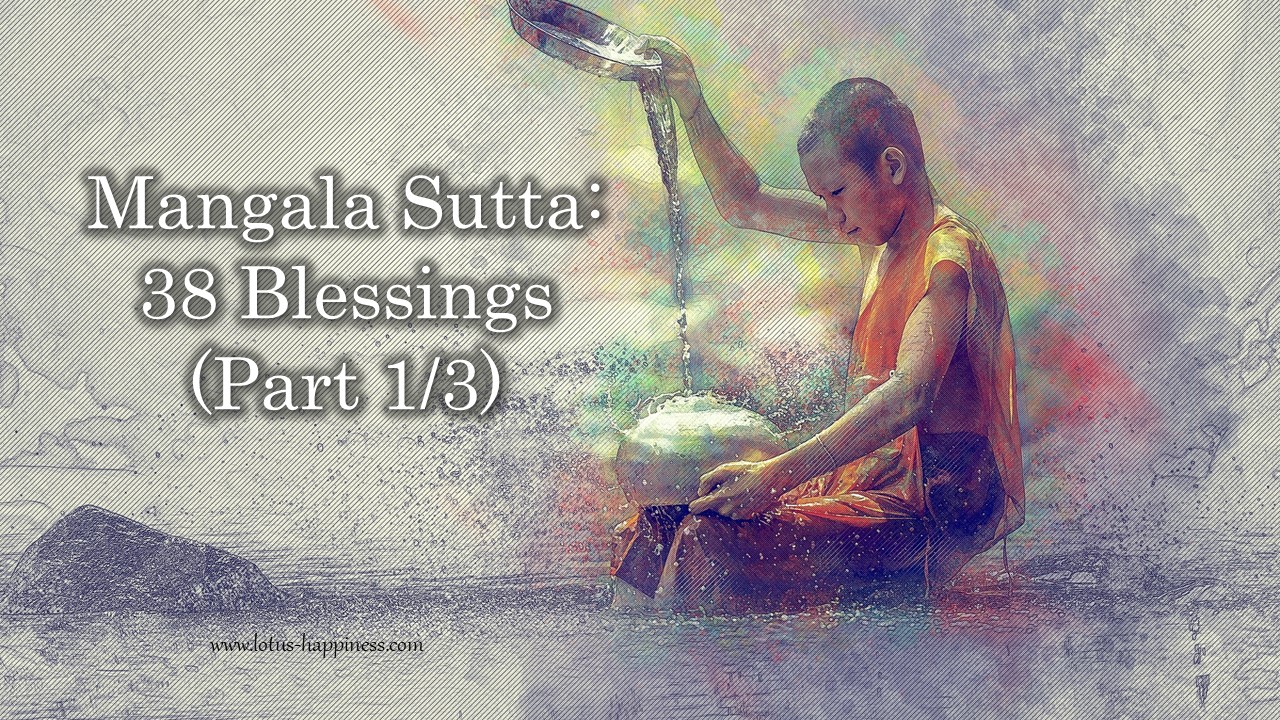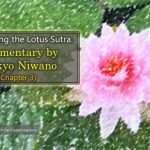Mangala Sutta: 38 Blessings (Part 1/3)
In the Mangala Sutta, the Buddha said that there are 38 highest blessings in life. The reason why there are so many different ‘highest blessings’ is because what may be the ‘highest blessing’ for one, may not be so for another. A person at a particular stage in life has a ‘highest blessing’ appropriate for his or her own individual stage of development. Therefore as a person grows, so also does the ‘highest blessing’ change, and working towards further ‘highest blessings’ leads to more progress along the path.
The 38 blessings can be categorized into five different groups: the Essential Blessings, Supporting Blessings, Personal Blessings, Higher Blessings and Supreme Blessings. Each group reflects the personal and spiritual evolution of each individual, and the qualities needed for further progress.
This teaching is thus a very detailed guide for individual development. It is set out in a logical and well structured sequence such that each group of blessings helps to lay the foundations for further blessings. It includes the most basic blessings, or qualities, each person should have, and leads gradually to the higher qualities required to attain the ultimate blessing of Nibbana. This is the main purpose and objective of the Mangala Sutta.
Part 1: The Essential Blessings:
1.To avoid the company of fools
2. To associate with the wise
3. honour those who are worthy of honour
4. To live in a suitable place
5. To have done good deeds in the past
6. To be on the right path
The Essential Blessings consists of the most basic and fundamental qualities that everyone should have. The elements of this group must be established to obtain both worldly and spiritual progress.
#1 – To avoid the company of fools
Fools are people who are unable to tell right from wrong, and as a result cause harm to others through their actions. They are not concerned with basic morality as they do not care very much about the consequences of their actions. By associating unmindfully with such people, it will be difficult to make any kind of material or spiritual progress as there is always the tendency to behave in a similar manner. Furthermore, there will be hardly any desire or motivation to do good deeds or improve oneself.
However, we must be prepared to lend assistance if it is needed and also help others to improve themselves. Thus we should not totally avoid the fools. What is important is that we remain mindful at all times and never allow ourselves to be adversely influenced by them. This blessing is right at the top of the Buddha’s list and is clearly the single most important blessing for any individual to have, because without this blessing there will be none to follow.
#2 – To associate with the wise
The wise are those who have acquired the wisdom to tell right from wrong and thus avoid causing harm to others. They are aware that their actions have consequences on not only their present life, but in their future lives too. They discourage wrong-doing and encourage doing good deeds. We should always try to associate with such upright and virtuous people as proper friendships are of absolute importance in our lives, no matter what stage of progress we have reached.
#3 – To respect those who are worthy of respect
Our parents, elders and teachers are the people we should honour and respect. We can respect them materially or through our conduct. By giving them due respect and honour, we can benefit from their guidance and continue to learn from them.
#4 – To live in a suitable place
A suitable place has both a material and spiritual meaning. Materially, it means a peaceful place where life and property are reasonably secure. Spiritually, it means a place and time where the teachings of the Buddha are known, and where one is able to learn and practice the teachings in peace. The blessing of living in a suitable place allows for both material and spiritual progress.
#5 – To have done good deeds in the past
We are continually reaping the results of our past actions. For example, if we had helped many people in the past, it is likely that when we require help ourselves, we will have the aid of some of the people whom we had previously helped. In the same way, if we continue to help others now, it is likely that in the future we will have the assistance of someone we had just helped. Thus, we must continue doing good deeds for the future. It is a twin blessing to have done good deeds in the past, and to be able to continue to do good deeds for the future.
#6 – To be on the right path
Most people do not even know that they are on the wrong path, much less being aware of the right path that they should take. The wrong path is that of immorality, greed and ignorance. The right path is that of virtue, generosity and wisdom. It is thus a great blessing to know the right path, and to set oneself on this path of material and spiritual progress.
Part 2: The Supporting Blessings:
7. To have a good education
8. To be proficient at work
9. To follow a code of discipline
10. To practice pleasant speech
11. To support our parents
12. To take care of our spouse and children
13. To have occupations which do not cause harm
This group of blessings relate to our preparations for adult and family life and are the factors necessary for a successful, balanced and wholesome material life. Having these Supporting Blessings allows for further progress towards higher ideals.
7. To have a good education
This refers to both a general as well as a moral education. A good general education is essential for our material welfare and a good moral education, such as learning the Buddha’s teachings, is important for our spiritual welfare.
8. To be proficient at work
We must be able to support ourselves and our family and in order to do so, we have to be able to earn a decent living. We must have the necessary skills and qualifications and apply them properly to our work. Being able to earn a proper living, and not having to struggle to survive or resort to dishonesty or crime, is essential for both material and spiritual advancement.
9. To follow a code of discipline
Observing the Five Precepts strengthens our resolve and ability to avoid immoral and harmful actions. Following such a code of discipline will keep us from the trouble and difficulties that such negative actions eventually bring.
The Five Precepts
1. To abstain from killing any living beings.
2. To abstain from taking what is not given.
3. To abstain from sexual misconduct.
4. To abstain from lying and false speech.
5. To abstain from the abusive consumption of intoxicants and drugs.
10. To practice pleasant speech
Speech is our main form of interaction with others in society. If we were to always lie, gossip, scold or speak ill of others, we will have many enemies and people will dislike and distrust us. This will hinder greatly the material and spiritual progress we hope to achieve. We should thus always speak what is true, meaningful, pleasant and beneficial for the good of ourselves and others too.
11. To support our parents
Our parents brought us into this world and cared for us from birth. It is only the most heartless and uncaring individuals who will not help their own parents. We must show gratitude by supporting them materially and physically when it is required, and by always returning their love and care. The Buddha said that the only way we can ever fully repay our parents is to share and instil them in the Dhamma.
12. To take care of our spouse and children
Although this seems obvious enough, there are people who do not fulfil this basic duty towards their families. We must support and remain faithful to our spouse, and provide for our children with material needs, parental support and a good education. This would include the crucial duty of teaching them the Dhamma for their own long-lasting peace and happiness. Taking proper care of our family means that we have a household with peace and harmony and is another important factor necessary for spiritual development.
13. To have occupations which do not cause harm
According to the Noble Eightfold Path, we should avoid occupations that involve killing, the sale of animal flesh, the trading of humans, weapons, poisons and intoxicants. Occupations which are unethical, immoral and illegal should also be avoided. Engaging in any work which causes harm to others will never allow anyone the true peace of mind essential for spiritual development. It is thus a great blessing if we can earn a living by means which are free from unwholesome activities.












